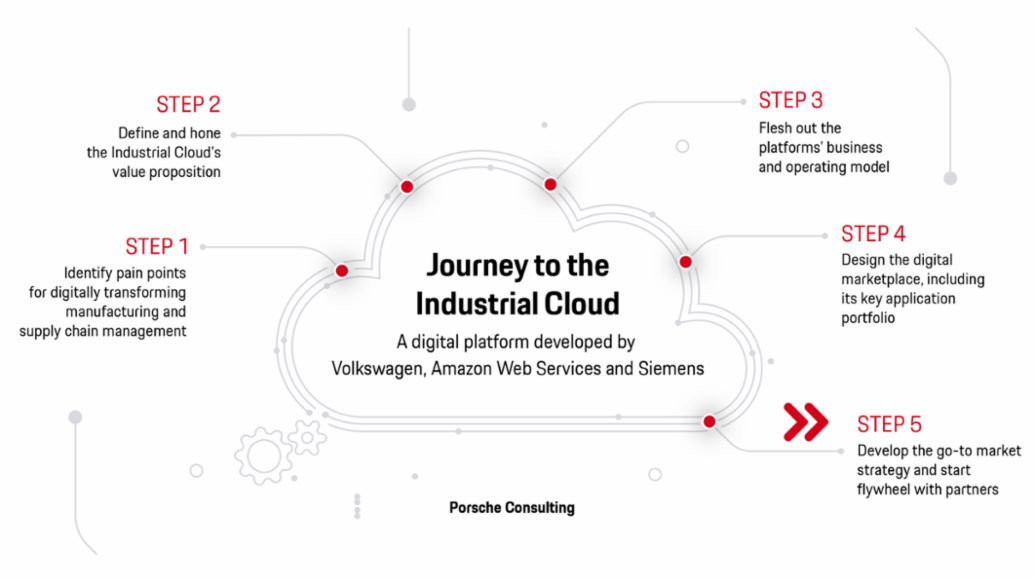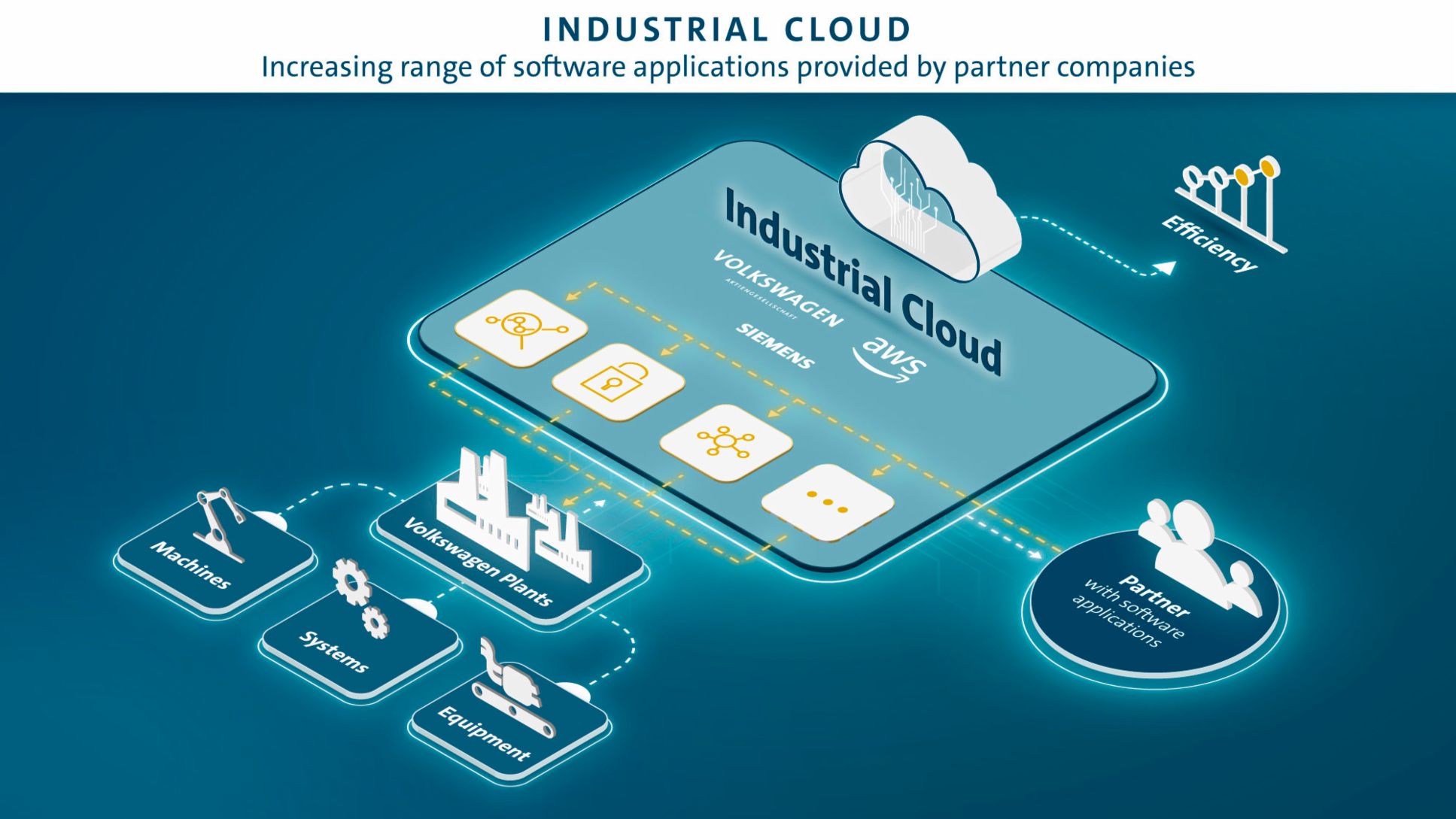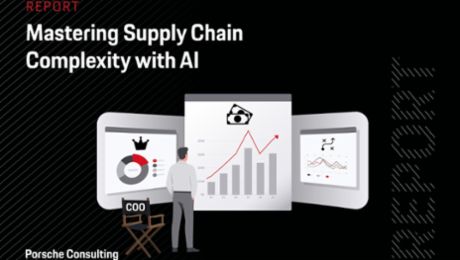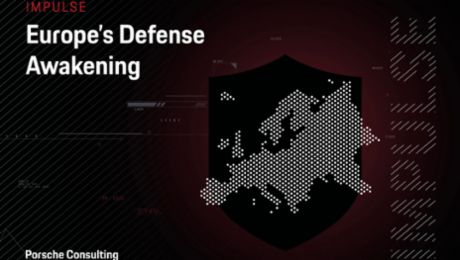The Volkswagen Industrial Cloud is about much more than connecting physical infrastructure to the network. Nihar Patel, Executive Vice President New Business Development at Volkswagen, and Jonathan Allen, Professional Services Director at Amazon Web Services (AWS) explain why it will become a flywheel for innovation along the automotive supply chain – and even beyond.
What exactly is the vision behind the Volkswagen Industrial Cloud?
Nihar Patel: The Industrial Cloud is a digital platform developed by Volkswagen, AWS and Siemens. Together, we have the goal to provide a comprehensive collection of Industrial Internet of Things (IIoT) solutions and data insights to transform operations in our plants and along our entire supply chain. Within the Volkswagen Group, it will combine the data of all machines, plants and systems by connecting our locations globally. It will be the backbone for the Group’s digital transformation of production and logistics, and a key lever for improving our productivity by 30 percent. And it’s designed as an open industry platform to include other partners such as manufacturing and technology companies. Everyone participating can contribute and use software-based solutions in the Industrial Cloud.

How did this partnership to build something so new and bold evolve?
Patel: Over two years ago, we started looking into how to bring our production and logistics into the digital age and develop IIoT solutions to boost efficiency in our plants. Volkswagen has in-depth knowledge of industrial processes and excellence in production. For the Industrial Cloud, however, we needed partners to help us, including a strong cloud partner. And we chose Amazon with its extensive knowhow in innovative cloud technologies, especially for near-production environments.
Jonathan Allen: The AWS portfolio comprises over 175 services overall for compute, storage, databases, networking, analytics, robotics and machine learning. We’re using many of those technologies for the Industrial Cloud, tailored to meet Volkswagen’s special requirements. But we’re doing something a little bit different as our IoT service team and Volkswagen experts are also on-site to build the platform in joint offices in Berlin. It’s that kind of side-by-side collaboration that leads to the growth of our services and features.
The Industrial Cloud is designed as an open platform. What does that mean — and why is it architected that way?
Patel: There are two levels of engagement when it comes to openness. First within Volkswagen, we encourage our people from all brands to develop use cases either with a local focus or for a Group-wide roll-out. Beyond that, there’s the world of external partners. We want to build a vibrant digital network that thrives thanks to all the contributors who put innovative ideas on the platform as well. The cloud enables them to speak the same transaction language. That is important if you want to connect plants and their tooling that might at times be 60 years old with new, digital technology.
Allen: Partners are crucial for the success of the Industrial Cloud. The more the companies contribute to solving the existing challenges, the more dynamic the Industrial Cloud will become. Together we can create a platform with IIoT solutions from which many partners can benefit – companies from the automotive industry and even beyond.
There are 13 partners participating already. How big do you envision the community to be, and what benefits can the partners expect?
Allen: Such a community is attractive for contributors and consumers alike and eventually creates a flywheel that propels goodness forward. It all starts with Volkswagen as the first consumer. But many manufacturing companies face similar challenges. Partners applications that have shown great results for the Industrial Cloud within Volkswagen, might also attract other customers. It’s a win-win for everyone involved.
Patel: The journey of transforming into a data-driven company is all about discovering unused potential. We get the flywheel going by getting our plants technologically on board so that they can make use of their data to be more productive and innovative. For instance, with the help of partner applications we optimize our maintenance cycles reducing downtimes in production processes by analyzing streams of data. Another application reduces potential rework on vehicles through the use of artificial intelligence. The solutions developed at one plant can be shared to many others.
Looking at the supply chain, can you give us an example how the Industrial Cloud can be beneficial to partners?
Patel: Transparency in the supply chain is crucial for all, this became especially obvious during the pandemic. When you’re running a plant, you need to know from tier one through tier X if a downstream supplier has any availability or quality issues. But it’s important that our partners see a benefit from opening up. No system will work unless you give something back in the form of data and information.
Aren’t there risks associated with giving external partners access to your data?
Allen: Coming from the cybersecurity world where I spent almost two decades of my professional life, I can tell you that the cloud is safer than on-premise. Security will always be our top priority. AWS offers more than 200 security, compliance, and governance services to manage data access. We are using many of these tools to manage data access for the Industrial Cloud. That way, users are always in control to choose with whom they share what data. On top of that, all data is encrypted and only accessible through carefully vetted applications. The encrypted data are hosted locally where they arise and they stay there. For instance, the data coming from German Volkswagen sites are hosted on AWS servers in Frankfurt and never leave that place.
Patel: We believe, it’s a give-and-take. We see that sharing the necessary data - of course within the applicable legal frameworks - leads to better solutions, more innovation. The key is selectivity. We decide which data we share with whom and for what purpose.
Can you tell us what the next important milestones are?
Patel: The plumbing is set up, so we are deploying teams, some virtually and some in-person, to connect factories globally. Some plants are already incubating use cases while other plants are taking them and extending them for their own needs. Once we get these use cases uploaded and moving, we use that flywheel innovation so other plants can start building their own use cases or come up with ideas for which they may not have the skillsets yet. They can get help through our partner network.
Allen: Together with our partners, we are continuously working on improving the platform and the solution portfolio. New partners who are willing to participate are highly welcome to co-create the Industrial Cloud, as we are already doing.
How did the journey go so far and who helped you along the way?
Allen: There were already many great use cases in the areas of production and supply chain logistics from different brands within the Volkswagen Group. So we were able to rely on their learnings and very quickly identify scaling opportunities. And Porsche Consulting was of great help with their culture of innovation and a can-do mindset.
Patel: I totally agree. This whole endeavor is not just about technology but also about a cultural change. Porsche Consulting is an integral part of our success story. Its team has supported the journey, our use case assessments and corporate reviews from the beginning, with their thought leadership. More recently, we've brought them in to help us set up the partner journey for the contributors and collaborators, and assess the business and operating model for the Industrial Cloud.
The Industrial Cloud
The Industrial Cloud is an open platform to drive digital innovation in the automotive industry – and beyond. It will connect all of Volkswagen’s plants around the world, bringing machines, production systems and entire plants securely and reliably on-line to optimize production and supply chain management. Volkswagen and AWS are opening up the Industrial Cloud to other manufacturing and logistics companies as well as software developers to contribute their own software applications for optimizing production processes to the Industrial Cloud. This way, a rapidly growing range of industrial software applications will be created.
Thought Leadership for the Industrial Cloud

Porsche Consulting has been an instrumental partner in defining, designing and implementing the Volkswagen Industrial Cloud every step of the journey:
1. Identify the pain points for digitally transforming manufacturing and supply chain management.
2. Define and hone the Industrial Cloud’s value proposition.
3. Flesh out the platform’s business and operating model.
4. Create the initial design of the digital marketplace, including its key application portfolio.
5. Develop the go-to market strategy for the Industrial Cloud and start flywheel with partners.




